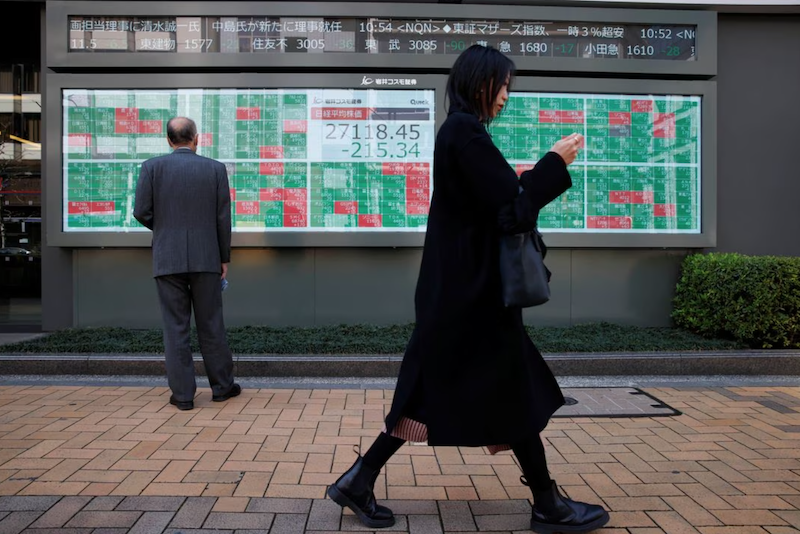Most Asian shares ended on a high on Friday and recouped most of the losses they suffered on during Monday’s manic trading, after optimistic US jobs data calmed fears of a looming recession.
Markets took their cue from an overnight rally on Wall Street after a bigger-than-expected drop in US unemployment claims suggested that fears the economy could be heading for a hard landing may have been overblown.
The biggest gainers in Asia were Taiwanese stocks, led up by a blistering rally in chip firms like TSMC and Hon Hai Precision, which closed with gains of 4.24% and 3.06% respectively.
Also on AF: ‘Banker to The Poor’ Leads Bangladesh’s Interim Government
Overnight TSMC’s American depositary receipts (ADRs) jumped more than 6%.
The Taiwan Stock Exchange’s benchmark weighted index, Taiex, closed 2.87% higher at 21,469.
In Japan, meanwhile, the Nikkei ended 0.56% higher at 35,025, bringing down its losses for the week to just 2.5% — a significant recovery from the brutal 12.4% sell-off on Monday.
Even so, the index saw another choppy day of trading, briefly falling 1% before the close of trade and then regaining its footing.
Investors also took positions carefully ahead of a long weekend. Japanese markets will be closed on Monday for a public holiday.
Analysts say volatility will likely continue into next week as market players look for data to support a soft landing scenario for the US.
“The US economy is slowing down, but it’s difficult to judge at the moment whether it will cool rapidly or gradually,” making the market more reactive to economic indicators, Masahiro Ichikawa, chief market strategist at Sumitomo Mitsui DS Asset Management, said.
The Bank of Japan’s decision last week to hike interest rates had also raised an alarm over how fast the central bank would tighten monetary policy.
But Monday’s sell-off prompted its deputy governor to do some damage control on Wednesday and reverse a calibrated strategy to communicate steady interest-rate rises.
While the BoJ managed to calm investor nerves with that move, the flip-flop tests the bank’s resolve to phase out decades of radical stimulus and could add to market volatility in coming weeks.
China stocks fall despite better inflation data
Over in China, stocks closed lower on Friday, even after data showed the country’s consumer prices increased at a faster-than-expected rate in July.
China’s consumer price index (CPI) edged up 0.5% in July from a year earlier, versus a 0.2% rise in June, the National Bureau of Statistics reported.
Analysts maintain, however, that demand in the world’s second-largest economy continues to be sluggish.
“Conditions are in place to see inflation trend a little higher in the coming months but it should not impede further monetary easing,” Lynn Song, chief economist of Greater China at ING, said.
“We continue to look for at least one more rate cut this year with the potential for more if global rate cuts accelerate,” she added.
At close of trade, the Shanghai Composite index was down 0.27% at 2,862.19. Its losses for the week stood at about 1.5%.
The blue-chip CSI300 index also closed 0.34% lower, dragged down by losses in real-estate and healthcare stocks.
For the week, the CSI 300 fell 1.6%.
The mood over in Hong Kong was starkly opposite, however, with the Hang Seng index surging 1.16% on that back of rallies in tech and property shares. The index was up 0.9% for the week.
Around the region, Seoul, Bangkok, Jakarta, Mumbai and Manila all closed firmly in the green. MSCI’s broadest index of Asia-Pacific shares outside Japan was up +1.64% at 1:04 PM GMT.
Key figures
Tokyo – Nikkei 225 > UP 0.56% at 35,025.00 (close)
Hong Kong – Hang Seng Index > UP 1.17% at 17,090.23 (close)
Shanghai – Composite < DOWN 0.27% at 2,862.19 (close)
London – FTSE 100 > UP 0.21% at 8,162.15 (0115 GMT)
New York – Dow > UP 1.76% at 39,446.49 (Thursday close)
- Reuters, with additional editing and inputs from Vishakha Saxena
























